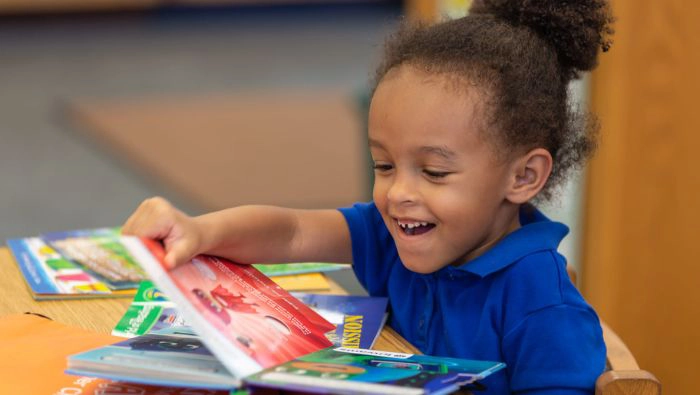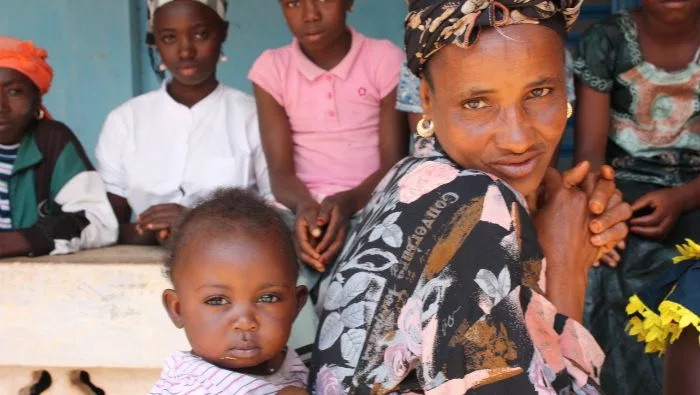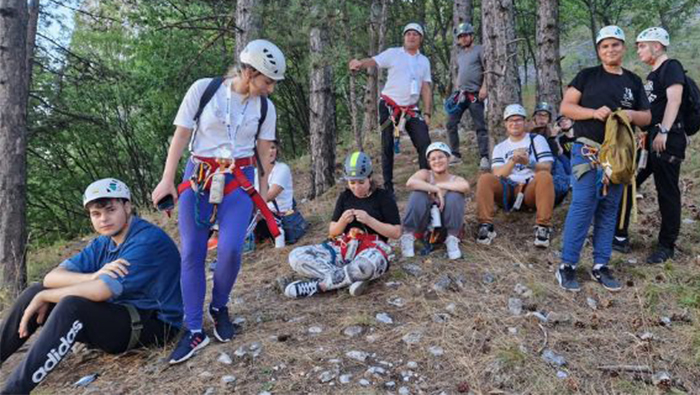
Grants fund many ways to read
Thanks to Kiwanis Children’s Fund club grants, more kids around the world are reading and learning.
By Erin Chandler
Kiwanis clubs around the world are turning kids into lifelong learners — and the Kiwanis Children’s Fund is there to help. In August, the Children’s Fund awarded grants to eight clubs that brought books into children’s homes and classrooms, overcame language barriers, bridged learning gaps with online apps and combated the stigmas surrounding learning disabilities. And they recruited lots of new Kiwanians along the way!
Textbooks and other tools for learning
The Kiwanis Club of Yaoundé, Cameroon, noticed that some children in low-income areas were going to school without the necessary textbooks, while others were not attending school at all. In 2019, the club launched a project in conjunction with area partners to provide textbooks and notebooks to 100 kindergarten and primary school students. The children they helped saw dramatic progress in their academic achievement. With help from a Kiwanis Children’s Fund grant, the club hopes to meet this year’s expanded goal of delivering textbooks, notebooks, writing utensils and other school supplies to 250 children.
The reward of reading
With help from a Kiwanis Children’s Fund club grant, the Kiwanis Club of Myrtle Beach, South Carolina, U.S., plans to install book vending machines in area elementary and middle schools that are part of the Title I program. The club estimates that over 5,000 students will be able to select books from the machines as rewards for good deeds, good grades and good citizenship. Club members will also work directly with the students. The machines will be continuously stocked with books purchased through club and school fundraisers.
A little holiday reading
Before the month of December, 60 children in kindergarten through second grade will each be given a basket of 25 giftwrapped books by the Kiwanis Club of Jefferson, Georgia, U.S. It’s all part of the club’s Literary Launch program. One book can be opened each day of December leading up to Christmas, with the addition of a toy to open on the last day. Book basket recipients are selected by local schools based on family income, so that children who might not have many books at home will be able to build their own home libraries. With help from the Kiwanis Children’s Fund, the club hopes to purchase all new books this year.
A community culture of reading
The community of Ormond Beach, Florida, U.S., knows the Kiwanis Club of Ormond Beach as “the organization that gets books into kids’ hands.” Through their Kiwanis READS! Backers-4-Books program, the club supplies books to Ormond Beach Elementary School’s media center and classrooms. They also organize an annual sponsored book fair that lets children take home four books for free. In partnership with Volusia County Library, the club hosts a summer reading challenge and read-a-thon, and at the beginning of the school year, they honor top readers with an ice cream party. A grant from the Kiwanis Children’s Fund will help the club expand its efforts across the five Ormond Beach elementary schools.
Literacy across languages
Three years ago, the Kiwanis Club of Plano, Texas, U.S., launched Books and Buddies, a project to provide bilingual books in English and Spanish for early readers who come from Spanish-speaking families. The project has received positive feedback from both parents and teachers. This year, a Kiwanis Children’s Fund grant will help the club print 1,500 copies of a brightly colored bilingual booklet containing a story and information about dialing 911 in an emergency. The booklets will be distributed at after-school events and to Boys and Girls Clubs, waiting rooms, Head Start programs and more.
Apps for accessibility
Last year, the Kiwanis Club of Papine in Kingston, Jamaica, helped 130 students at the Jamaica House Basic School and Danny Williams School for the Deaf improve their literacy skills. The club served the students through a combination of the Lalilo online early childhood literacy tool, donated books, access to virtual libraries, tuition support and a reading competition. However, they had to limit the scope of the project to schools that had access to the necessary electronic devices. A Kiwanis Children’s Fund grant will help them bring students and schools with greater financial need on board with the purchase of more tablets and more accessible devices for deaf students. The Reading For the Stars program saw great success in its first year, with 80% of parents reporting improvements in their children’s reading. The club plans to continue its effectiveness based on regular community needs assessments.
Literacy through technology
The Kiwanis Club of Imperial Beach-South Bay, California, U.S., is also turning to technology. A grant from the Kiwanis Children’s Fund will help the club purchase more subscriptions to the Readability Tutor online app — as well as tablets so more students can access it. The club will also partner with the local library for literacy events, where they will give out free books. In an area where the primary language in many homes is Spanish — and fewer than 30% of students currently meet English Language Arts curriculum standards — the club hopes to help 100 children in kindergarten through sixth grade to meaningfully enhance their English reading skills and scores through its 2023-24 Literacy Program.
Raising awareness, fighting stigmas
The Kiwanis Club of Montego Freeport, Jamaica, is helping to end the stigma surrounding learning disabilities. Through its Learning Disabilities Awareness Program, the club partnered last year with Sam Sharpe Diagnostic and Early Intervention Centre to assess 45 students for issues such as ADHD, dyslexia and others. Those in whom learning disabilities were identified have seen improved verbal skills and academic performance, thanks to academic intervention and treatment. In addition, teachers have been trained to recognize signs of learning disabilities. Sam Sharpe is currently the only public facility in western Jamaica that diagnoses learning disabilities, with over 100 students on a waitlist, so the Montego Freeport Kiwanians decided to expand their assessment program this year. A grant from the Kiwanis Children’s Fund will help them assess 100 children and establish a support group for parents.
How you can help
The Kiwanis Children’s Fund makes grants that improve the lives of children around the world by identifying the projects that create a continuum of impact in a child’s life — one that spans their entire childhood and sets them up for a bright future. By funding projects that target the Kiwanis causes—health and nutrition, education and literacy, and youth leadership development— whether through a Kiwanis Club’s local service project or through a club’s partner, the Children’s Fund ensures that its grantmaking has the greatest possible impact.
If you are interested in extending your and your club’s impact beyond your community, make a gift to the Children’s Fund or learn how your club can apply for a grant to help kids in your community.


